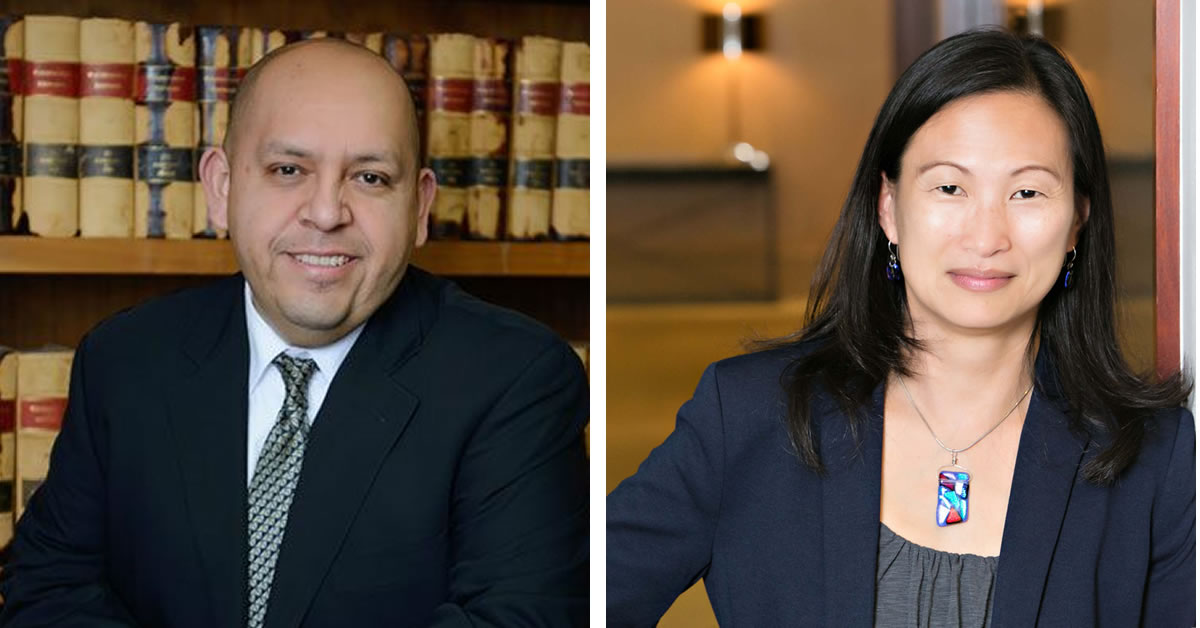A cloture petition recently filed in the U.S. Senate suggests that we are close to a final vote on the confirmation of President Biden’s nominations of Grant County Superior Court Judge David Estudillo and civil rights attorney Tana Lin to the U.S. District Court for the Western District of Washington.
This is a big deal, for diversity on the federal bench as well as strengthening a federal bench that has delivered landmark decisions. As Senator Patty Murray, D‑Washington, put it when the nominations were announced: “The federal judicial system plays a deeply significant role in shaping our everyday lives: It’s important to appoint highly qualified individuals who also reflect the makeup of our country.”
When appointed by Governor Jay Inslee to his Grant County post in 2015, Estudillo became the first Latino to serve as a superior court judge east of the Cascades. He has since been retained by voters in the conservative Central Washington county, despite Trumpian campaign tactics.
Lin would become the first Asian American on the federal bench in Western Washington. She has practiced civil rights law and once worked for the Civil Rights Division of the U.S. Justice Department. She is president of the board of directors of the American Civil Liberties Union of Washington.
The names were put forward by Senators Murray and Maria Cantwell, D‑Washington, in accordance with tradition. They “reflect the diversity we need on the federal bench,” said Cantwell, and both are “highly qualified.”
They need to be. Lives of Northwesterners have been shaped by decisions coming down from the federal courthouse. Unlike the U.S. Supreme Court, which has increasingly sided with business and weakened civil rights enforcement, the underdog has often emerged as top dog in rulings here.
The most famous ruling came in 1974 when U.S. District Judge George Boldt, a Richard Nixon appointee, ruled that Native American tribes were entitled to fifty percent of the commercial salmon catch.
The fishing industry was outraged: A blockade of fishing boats greeted President Gerald Ford when he arrived for a 1976 rally at the Seattle waterfront.
Still, despite predictions from then-Attorney General Slade Gorton, the Boldt decision held up on appeal. And, thanks to Native American leader Billy Frank, Jr., it became an impetus for restoration of decimated salmon runs. To catch fish, Frank explained, both native and non-native fishers needed fish.
As suggested by Inslee’s appointment of Estudillo, the Hispanic population of Eastern Washington has found itself largely excluded from high office.
And not by accident.
OneAmerica and the ACLU, with help from the Perkins Coie law firm, won a landmark ruling when they challenged Yakima’s at-large system for electing city Council members. U.S. District Judge Thomas Rice found that by at-large voting “the non-Latino majority in Yakima routinely suffocates the voting preferences of the Latino minority.”
Three candidates from the Latino community were subsequently elected to the City Council. Now it’s the county’s turn. Under a settlement now pending in Kittitas County Superior Court, Yakima County Commissioners will henceforth be both nominated and elected by district rather than at large.
There are other rulings that come to mind, too.
For example: Unprotected old-growth forest was being clear cut at a rate of 60,000 acres a year in federal forests of the Pacific Northwest.
U.S. District Judge Bill Dwyer ruled that the U.S. Forest Service was violating the Endangered Species Act by imperiling the northern spotted owl.
Senator Slade Gorton had championed Dwyer’s nomination to the federal bench by President Reagan, but showered his old friend with denunciations.
Dwyer was also to throw out Washington’s initiative decreeing term limits for federal officeholders, in a Supreme Court-quality opinion that held up through appeal. Along with now senior U.S. District Judge Jack Coughenouer – who president over trial of the Millennial Bomber – Dwyer was a powerful presence whose influence extended beyond the local bench.
The most famous recent ruling out of the Western District came in 2017, when U.S. District Judge James Robart granted a temporary restraining order blocking Donald Trump’s first travel ban targeting Muslims from going into effect.
The U.S. Ninth Circuit Court of Appeals later upheld Robart’s ruling, leading to Trump’s Twitter tantrum against a “so-called judge.”
Attorney General Bob Ferguson has made masterful use of U.S. District Courts, in both Western and Eastern Districts of Washington, to block Trump actions, from rollbacks of environmental regulations to attempts at hamstringing federal funding to Planned Parenthood. Judge Robart would go on CBS’ “60 Minutes” to relate the threats and hate mail he received from supporters of the former president.
(Robart has also presided over the U.S. Justice Department’s consent decree and overseen reforms to the Seattle Police Department.)
Assuming confirmation by the U.S. Senate, Judges Estudillo and Lin can expect a full workload. The Western District of Washington has been reduced to just two active district judges — Ricardo Martinez and Richard Jones – while nine judges on senior status continue to carry heavy workloads. Lawyers who are unprepared appear at their own risk in Jack Coughenouer’s courtroom.
The new judges can look around for reminders of justice in the Northwest.
The Nisqually National Wildlife Refuge bears the name of Billy Frank, Jr., who endured thirty plus arrests while championing tribal fishing rights.
The jury room at Seattle’s new federal courthouse is named for Bill Dwyer, who published a book celebrating the jury system as he was dying of cancer.
The old federal courthouse is named for William K. Nakamura, a Japanese-American sent to an internment camp with his family in 1942, but was awarded the Congressional Medal of Honor as a soldier on the Italian front in World War II. He was killed on Independence Day in 1944.

